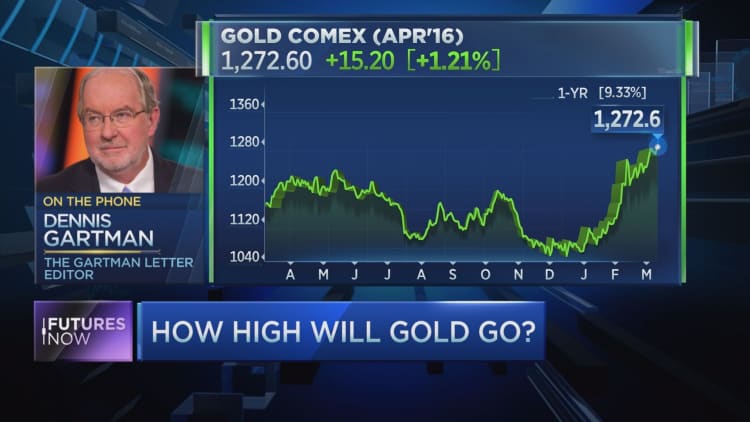Caught in a quiet period between central bank news, stocks could look to oil prices and overnight China action for direction on Friday.
"I think we might be looking back towards oil and China as being the defining factors of the market, making our market somewhat uninvestible," said Dan Veru, chief investment officer at Palisade Capital Management.
"If the correlations remain high, active managers are going to really struggle. It's going to be really tough to do your job. The markets really aren't tied to anything fundamental," he said.
Read MoreExpert: What the ECB is really doing
U.S. crude oil futures settled lower Thursday but well off session lows, down 45 cents at $37.84 a barrel. Reuters, citing sources, said a meeting between OPEC and non-OPEC producers is unlikely to happen on March 20, as Iran has yet to commit to an oil production freeze.
The weekly oil rig count due Friday afternoon could add support to the view that U.S. production continues to decline and help curb oversupply. The only major economic data on the schedule are February import prices, which are expected to show a slight decline.
China data expected overnight include reports on loan growth and money supply.
Read More CLO business on Wall St is showing a big slowdown
"The last time, we saw a big jump in new loans. A lot of people will be (wanting to) see if that was a one-off or a renewed emphasis on growth," said Sameer Samana, senior global strategist at Wells Fargo Investment Institute.
He is also watching the Chinese yuan for signs of continued stabilization.
U.S. stocks traded in a wide range Thursday after the European Central Bank's stimulus announcements largely beat expectations, while ECB President Mario Draghi surprised markets by saying he didn't anticipate a need to reduce rates further.
"Rates will stay low, very low, for a long period of time and well past the horizon of our purchases," Draghi said at a press conference following the ECB's announcement. "From today's perspective and taking into account the support of our measures to growth and inflation, we don't anticipate that it will be necessary to reduce rates further. Of course, new facts can change the situation and the outlook."
Among several measures announced Thursday, the ECB cut the deposit rate to negative 0.4 percent from minus 0.3 percent, and lowered the refinancing rate 5 basis points to 0.0 percent. The central bank also increased its asset purchase program from 60 billion euros to 80 billion euros a month.
"It seems like there's a lot of confusion out there," Veru said, adding that Wall Street will be searching in the next few days for more clarity on the actual impact of the ECB policy measures.
Read MoreThese stocks are quietly hitting a record high
The euro climbed to nearly a one-month high against the dollar in its biggest positive reversal, according to Bespoke. The euro was a touch off session highs at $1.118 in late trade Thursday.
"I think the reversal is not grounded in fundamentals," said Thierry Albert Wizman, global interest rates and currencies strategist at Macquarie.

"Notwithstanding that Draghi's comments were intended to provide an outlook for policy interest rates only, which are already at zero or below, his comments were also conditional (i.e., based upon the current view), and thus should not be used to rule out further easing, either in rates or through more QE. In fact, we would not read into Draghi's comment that the ECB is no longer in a 'do whatever it takes' mode," Wizman said in a note.
The German 10-year bund yield shot up from near 0.16 to 0.31 percent in intraday trade. U.S. Treasury yields also climbed, with the 2-year yield hitting 0.938 percent, its highest level since Jan. 13. The 10-year yield touched a high of 1.952 percent, its highest since Feb. 2.
Read MoreThis chart may hold the key to markets: Technician
U.S. stocks rallied about 0.8 percent in the open before dropping more than 1 percent, then recovering most of their losses to end little changed. European equities gave up gains to close more than 1.5 percent lower, with the German DAX underperforming with losses of 2.3 percent.
The closed down 5.23 points at 16,995.13 while the S&P 500 managed to close up 0.31 points at 1,989.57. The Nasdaq composite underperformed with a 0.26 percent decline to 4,662.16.
With Thursday's mixed close, the major averages were on pace for a weekly decline, after three-straight weeks of gains.
Read MoreCalls grow for Fed to hike rates in March
"Apparently investors have lost some faith in the ECB and monetary policy according to what trading is doing today," said Jack Ablin, chief investment officer at BMO Private Bank. "We've been skeptical that monetary policy in the U.S. has largely run its course."
The Federal Reserve and Bank of Japan are scheduled to hold meetings next week.
No major earnings are scheduled for release Friday.


